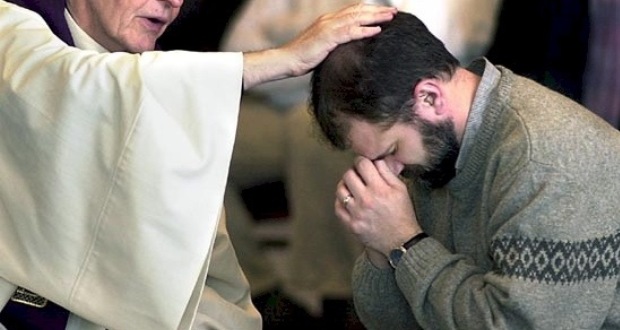Neither Do I Condemn You

God does not condemn us, he encourages us to sin no more
We are gathered here on this afternoon of the 5th Sunday of Lent for a special reason. You will notice that the vestments are white and that the Gloria was sung. That is not normal during Lent. Today we make an exception however because we have come to thank God for giving us a Pope. Pope Francis. He is the first non-European bishop of Rome in over a thousand years. He is from Latin America. In ecclesial geography the Caribbean is part of Latin America. As such he is from our region, he is one of us. It is good for us then to celebrate because someone closer to us in character and culture is now our leader. You would have noticed no doubt if you followed his meeting with the Cardinals how tactile he is, a truly latino-Caribbean trait.
Our thanksgiving cannot be simply however because we have a Pope and because in a broader sense, he is from our region. As good disciples of the Lord Jesus we know that God speaks to us in the scriptures and so we search the scriptures given to us for our meditation this weekend in order to discover what the Lord is saying to us and how it applies to this event which we are celebrating. The Gospel story we know very well. It is the story of the woman caught in the very act of adultery and the reaction of the onlookers to this sin. The scribes and Pharisees who are the keepers of the law, who think it their duty to ensure that the law is kept in all its purity, want this woman put to death. So they said to Jesus, “Teacher, this woman was caught in the very act of committing adultery. Now in the law, Moses commanded us to stone such women.” Of course the Scribes and Pharisees were not concerned about the law. Their concern was the re-capturing of the power which they had lost because of Jesus’ preaching and healing ministry. The woman taken in adultery was only a pawn in their game. Her conversion to being a keeper of the law was no concern of theirs.
But isn’t this how we act so frequently? How often are children just pawns in the game in the litigation between estranged parents? How often are persons used and abused in the struggle for power in business corporations? How often are persons and districts just pawns in the political struggle for power? How often does this happens even within the church? This happens in all spheres of life, be it in religion, politics or business in spite of the pious self-righteous discourse of those engaged in the struggle for power.
The gospel reading for this weekend however brings us, as it should, Good News. Jesus confronts the sin of the Scribes and Pharisees and the sin of the woman, not with condemnation but with gentleness. He simply asks the Scribes and Pharisees to examine themselves and discover the adultery in their own hearts; “Let the one among you who is without sin be the first to throw a stone at her.” After this self-examination, we are told that the woman’s accusers all retreated. “And in response, they went away one by one, beginning with the elders.” Jesus’ response to the scribes and Pharisees prevented them from committing an even greater sin.
Jesus’ response to the woman caught in the very act of adultery is openly non-condemnatory. Instead of condemning he encourages the woman to give up her sin. We are told that after dealing with the scribes and Pharisees, Jesus straightened up and said to the woman caught in adultery: “Woman, where are they? Has no one condemned you?” She replied, “No one, sir.” Then Jesus said, “Neither do I condemn you. Go, and from now on do not sin anymore.” The Good News for us is that God deals with all of us sinners in a non-condemnatory way. “God does not condemn us, he encourages us to sin no more.
What is further Good News is that today we have a Pope who calls us as individuals and as a church to self-examination, as Jesus called the Scribes and Pharisees to self-examination. How else can we interpret his words to the journalists gathered in Rome; “This is what I want, a poor church for the poor.” If we truly become what the Pope wishes, “a poor church for the poor” will we not be a church after the mind of Jesus Christ? Will the poor in our midst not give thanks to God because they will have experienced the love of God flowing through us? I promise you now that I will appoint a committee to study the ways in which we can embrace the notion of being a poor church for the poor and to suggest ways in which this can truly be reflected in the life and activity of every parish in our Archdiocese.
As we read the news reports of Pope Francis’ activities over the past days, we are all surprised and charmed by his humility and simplicity. Although it is still early days in this pontificate, I cannot help but think that he will confront this sinful world after the manner of Jesus, not in a condemnatory fashion but holding firmly to the truth and encouraging us to give up sinful ways and return to the Lord.
I cannot help but think that God has confronted this sinful world once again not with the force of arms or of natural disasters but in the simplicity, kindness and humility of Pope Francis. This truly is Good News.
What does all of this mean for us? It is important that all of us remember that the Church is not Pope Francis. We are the Church! While Pope Francis fulfills the ministry to which he has been called, i.e., “to confirm us, the brothers and sisters, in the faith”, you and I must live that faith so that those around us may come to experience the love of God through us and because of us. It also means that we pray for Pope Francis, that his faith may not fail and that he lead us all bishops, clergy and laity in ways of humility, gentleness and truth so that we be truly Good News for the people of this land as Jesus was good News for the woman caught in the very act of adultery.
As we thank God for the Good News of Pope Francis, let us not forget the Good News of Pope Benedict who in his resignation from the papacy taught us many things. He too taught us, in his resignation, humility. He taught us how to recognize the moment when we should give up power and not hang on to it. When we add this to Pope Francis who in the early days of his pontificate is already teaching us how to use power, we can truly proclaim, God has been good to us. His action with us over the past month has truly been Good News.
Prayer
All powerful and ever-living God, we thank you for the gift of Pope Francis. Be with him as he teaches us by his life and by his words how to hold power in gentleness and humility, never letting those in our care to be pawns in the struggle for power. Help us to be as Pope Francis wishes us to be; a poor church for the poor. We ask this through the intercession of Mary, our Mother and Jesus, your Son. Amen.
Gospel Jn 8:1-11
Jesus went to the Mount of Olives. But early in the morning he arrived again in the temple area, and all the people started coming to him, and he sat down and taught them. Then the scribes and the Pharisees brought a woman who had been caught in adultery and made her stand in the middle. They said to him, “Teacher, this woman was caught in the very act of committing adultery. Now in the law, Moses commanded us to stone such women. So what do you say?”
They said this to test him, so that they could have some charge to bring against him. Jesus bent down and began to write on the ground with his finger. But when they continued asking him, he straightened up and said to them, “Let the one among you who is without sin be the first to throw a stone at her.” Again he bent down and wrote on the ground. And in response, they went away one by one, beginning with the elders. So he was left alone with the woman before him.
Then Jesus straightened up and said to her, “Woman, where are they? Has no one condemned you?” She replied, “No one, sir.” Then Jesus said, “Neither do I condemn you. Go, and from now on do not sin anymore.”





